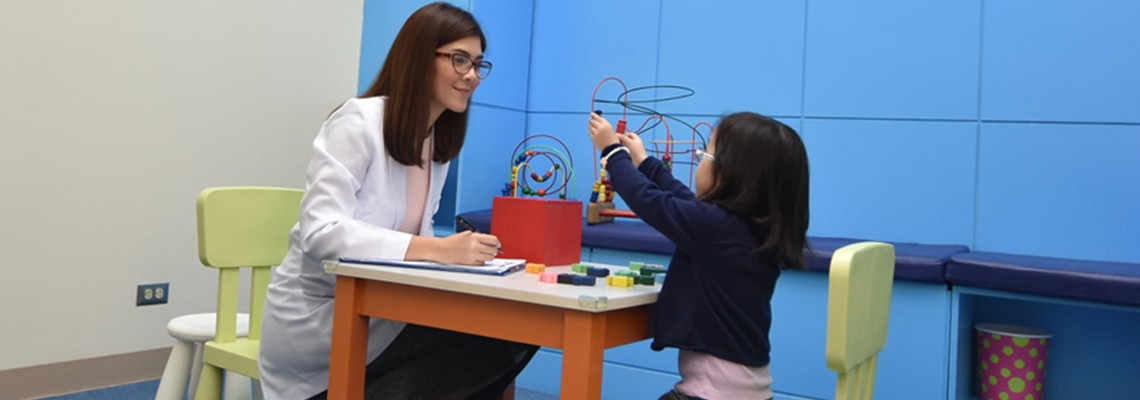
Neurodevelopmental Medicine
UPCOMING NEW SERVICES
Autism Diagnostic Observation Schedule-2 (ADOS-2) Evaluation
The Autism Diagnostic Observation Schedule-2 (ADOS-2) Evaluation is one aspect of assessment that aims to observe the child’s social interaction, language, repetitive and restricted behaviors, and sensory issues that are directly relevant to the diagnosis of Autism Spectrum Disorder (ASD) at different developmental levels and chronological ages.
The Autism Diagnostic Interview - Revised (ADI-R) Evaluation
The Autism Diagnostic Interview - Revised (ADI-R) evaluation aims to collect systematic interview as part of a comprehensive evaluation for children with developmental age of at least 2 years old being evaluated for Autism Spectrum Disorder. It is an extended interview designed to elicit a full range of information needed to produce diagnosis of Autism and to assist in the assessment of related disorders referred to as Autism Spectrum Disorders (ASDs).
Augmentative and Alternative Communication (AAC) Assessment and Therapy
According to American Speech-Language-Hearing Association (ASHA), “AAC involves attempts to study, and when necessary, compensate for temporary impairments, activity limitations, and participation restrictions of individuals with complex communication needs”.
Persons with complex communication needs are individuals who are unable to use natural speech to meet their daily communication needs. AAC assessment looks into the individual's strategic, linguistic, social, and operational competencies.
Through the use of gestures, low tech or high tech devices, AAC therapy aims to fulfill communicative interactions by (1) AUGMENTING what an individual has to repair (communication breakdowns) and (2) providing ALTERNATIVES when speech is not sufficient.
Speech and Language Therapy (Individualized and Group)
The Speech and Language Therapy service aims to manage the patient’s language and communication problems. Programs are individualized and formulated based on the patient’s current and future needs. Therapy likewise espouses close coordination and linkages with the family and other interventionists. Techniques and procedures are done with the end goal of improving language and communication skills for better quality of life.
EVALUATION SERVICES
Neurodevelopmental Evaluation
The Section of Neurodevelopmental Pediatrics offers a comprehensive neurodevelopmental evaluation of infants, children and adolescent with concerns that may involve both medical and behavioral features such as developmental problems, school problems, attention deficit/hyperactivity disorder and parent-child challenges. It helps identify the causes of a child's developmental delays and learning difficulties by evaluating the interaction between a child's brain, environment and learning function which will determine the therapeutic, medical and educational services that the child will need to reach his or her full potential for success in school and in life. The neurodevelopmental evaluation aims to provide a holistic view of the child in the context of their developmental profile.
Neurological Evaluation
A complete and thorough evaluation of a child's nervous system is essential in the assessment of infants, children and adolescents. It is of significance especially if there is any reason to think that there may be an underlying problem that affects a child’s development and behavior. This is because any concern on the integrity of the nervous system can cause delays in the child's normal development, behavior and functioning. The goal of the neurological evaluation is to detect abnormalities, localize them, manage them and monitor the changes closely. At the end of the neurological consultation, a diagnosis will be made, management recommendations are recommended and work-ups will be requested as needed.
Neuropsychological Consultation
A neuropsychological consultation is offered to children and adolescents who have been seen and/or diagnosed previously by other specialists. These children and adolescents may present with developmental, behavioral, learning, and/or socio-emotional concerns or may already be diagnosed by the specialists with learning disabilities/specific learning disorders and other neurodevelopmental disorders (e.g., Autism Spectrum Disorder, AD/HD, language disorders, intellectual disability, seizure disorders, etc.). The neuropsychological consultation aims to help parents in better understanding a child/adolescent’s functioning vis-à-vis the concerns presented. Moreover, result of the evaluation will be used in formulating or prioritizing goals for intervention planning, including appropriate specialists and strategies to be considered in light of the child/ adolescent’s specific needs. Recommendations for educational planning and other issues related to the child/adolescent’s placement are also provided.
Neuropsychological Consultation with Academic Testing
This is a 2½ hour session that includes an interview with the parents and testing of the child/adolescent using academic achievement tests in reading, spelling/written expression and math (informal projective tests may be given depending on the referral concern). A written summary will be given to parents after session and a formal written report will be given to the referring specialist and the parents after 1 week.
Child and Adolescent Psychiatric Evaluation
The Child and Adolescent Psychiatry Service is part of the multidisciplinary team of the neurodevelopmental center that provides consultation and comprehensive evaluation of behavior and mental health issues affecting the children, adolescents and their families. It offers medical and psychosocial treatment of psychiatric illnesses, as well as behavioral emotional difficulties with co-occurring inattention, anxiety, and depression. These issues include parent-child relational issues, attention-deficit-hyperactivity disorder, autism, mood, anxiety, psychotic disorders; and substance-related mood or behavioral disorders.
THERAPY SERVICES
Individualized Music Intervention Program
The Individualized Music Intervention Program is a holistic music program with therapeutic components that uses music as the medium to enhance musical sensibility, develop musical growth, and aptitude. The music intervention activities are personalized to address unique neurodevelopmental needs of each child. The program provides unstructured and structured music activities that will address our goals for the following: desired behaviors, development of expressive receptive skills, concept learning, school readiness, and groundwork’s for reading and writing, attention skill, creativity, gross and fine motor skills, emotional stability, sociability, and quality day to day living. The intervention activities aim to foster general development that may be arbitrary to music but it will eventually lead to musical appreciation and musical growth.
Occupational Therapy (Individualized and Group)
The Occupational Therapy focuses on the affected occupation and manages by practicing the lacking components of a skill. Drills may be provided to build the skill or a simulated task may be done.
Individualized Reading Program
The Individualized Reading Program aims to develop the child’s skills in spelling, decoding, passage reading, listening and reading comprehension, as well as oral and written language expression. It employs a research-based, holistic approach in developing children’s literacy skills. The program is success-oriented, based on the strengths and areas of concern of the child in order to develop independence, efficiency, and confidence in accomplishing reading and writing tasks in school and at home. This program is beneficial to various types of learners that are either at risk or diagnosed to have difficulties in both mechanical (spelling and decoding) and meaning (comprehension) aspects of reading from pre-school to college levels.
Reading Assessment
The Reading Assessment identifies the current attainments of the child in word reading, spelling, passage reading, oral reading comprehension, silent reading comprehension, and writing. This comprehensive reading assessment is a combination of standardized and informal tests on the abovementioned areas. Specific descriptions about the child’s strengths and weaknesses, as well as analyses of how these different components interplay and affect the child’s performance in reading and writing tasks will likewise be identified. This is helpful to children from preschool to high school that are at risk or diagnosed to have learning difficulties, and those that are showing difficulties in reading, spelling, comprehension, and/or written language expression.
Speech and Language Evaluation
The assessment aims to determine the patient’s skills and problems specific to speech, language and communication. Areas of scrutiny include vocabulary, comprehension, processing, and expression. Extensive assessment is likewise done on the patient’s communication, both verbal and nonverbal.
Music Sensibility Assessment
The Music Sensibility Assessment aims to determine the client’s response to musical elements (Dynamics, Timbre, Rhythm, Melody, Texture, Harmony), musical form and style, and musical instruments. The music aptitude of the client will be an incidental result when it is observed. The results of the assessment will be used in designing an individualized Music Intervention Program which will focus on sensibility (pleasurable reaction to musical sounds) rather than aptitude – power to acquire musical skill). The sensibility of the client will be utilized as a tool to achieve developmental and behavioral goals.
Occupational Therapy Evaluation
The Occupational Therapy or Occupational Performance Evaluation focuses on identifying occupations that are primarily affected. Occupation is defined as activities that people do to occupy their time and attention. These are activities that bring meaning and purpose to life. The goal of the evaluating therapist is to identify ways on how to help a person engage in different occupations such as Activities of daily living skills (ADLs), Instrumental activities of daily living skills (IADLs), Play, Social participation, Education or school participation, Leisure, Rest and sleep, Pre-vocational, and Work.
PROMPT Evaluation and Therapy
PROMPT, an acronym for PROMPTS for Restructuring Oral Muscular Phonetic Targets, is a multidimensional approach to speech production disorders has come to embrace not only the well-known physical-sensory aspects of motor performance, but also its cognitive-linguistic and social-emotional aspects. PROMPT is about integrating all domains and systems towards positive communication outcome. It may be used (with varying intensity and focus) with all speech production disorders from approximately 6 months of age onward. To achieve the best outcome with PROMPT it should not be thought of or used mainly to facilitate oral-motor skills, produce individual sounds/phonemes or as an articulation program but rather as a program to develop motor skill in the development of language for interaction.
Other components of assessment likewise explore higher and more mature language use. Areas of scrutiny include higher order thinking, reasoning, figurative language, social communication, and other related areas. Skills and problems are analyzed in relation to the patient’s language and learning and quality of life. Recommendations are given based on the needs and concerns.


